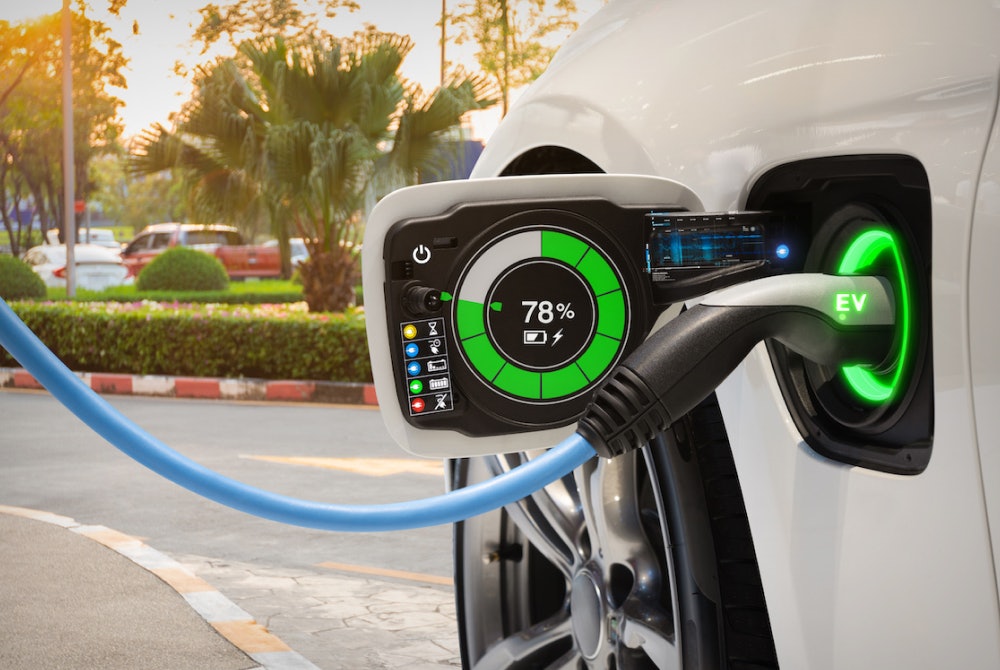- What to Know About Electric Vehicle Batteries
- How Long Do Electric Vehicle's Batteries Last?
- Factors that Affect Battery Range
- How Does Charging Affect Your Electric Vehicle's Battery?
- How Much Does an Electric Vehicle's Battery Cost?
- Tips to Making Your Electric Vehicle's Battery Last Longer
Although electric vehicles (EV) can save you a lot of cash at the pump, replacing their battery packs can be a pretty hefty expense. Which is why it’s important to know how long your electric vehicle's battery will last so that you can be aware of all the costs associated with owning an EV.
Read more below to learn more about electric car batteries, their life expectancy, and how to potentially extend their range.
What to Know About Electric Vehicle Batteries
Electric cars are powered by rechargeable lithium-ion batteries, similar to those used in cell phones and laptop computers—but much larger.
EV battery packs are also more energy dense than the lead-acid and rechargeable nickel-cadmium batteries found in internal combustion engines and hybrids, respectively. And, unlike other battery types, they’re less prone to lose their charge when not being used.
Did You Know?
An electric car's management system prevents the vehicle both fully charging and discharging in order to preserve its usable life and efficiency.
To notate an electric car’s battery capacity, you’ll see a number expressed in kilowatt-hours, or kWh. Those with a higher kWh rating will have longer ranges before needing a charge, similar to buying a car with a larger gas tank—you’ll make less stops than in one with a smaller tank.
How Long Do Electric Vehicle's Batteries Last?
An electric vehicle’s battery pack degrades slightly each charge and discharge cycle, but it’s a very slow process. For example, battery packs in a Tesla Model S have been shown to only lose around 5% of their original capacity throughout the first 50,000 miles.
After that, the depletion rate slows down even more.
There is some disagreement between how long EV battery packs last. But when cared for properly:
- Consumer Reports estimates the average EV battery pack’s lifespan to be at around 200,000 miles.
- Conservative estimates put their longevity closer to 100,000 miles or between 10-20 years depending how often you drive.
However, there’s often a disconnect between estimated EV battery ranges and what consumers think is actually true.
A recent survey by Cox Automotive showed that potential EV car buyers believe the average battery life of electric vehicles will reach 100,000 miles, while 46% believe it’ll only last 65,000 miles or less.
Thankfully, the federal government mandates that manufacturers offer a minimum of an 8-year/100,000-mile warranty on batteries, so wherever your car lands on the range meter, you should be covered. Some manufacturers offer longer warranties, some even boast lifetime warranties, though this is rare.
Factors that Affect Battery Range
If you purchased your vehicle with a high kWh but aren’t getting anywhere near its estimated range, it could be because of a few factors that affect battery range. This includes:
- Speed: If you’re regularly driving at higher sustained speeds (i.e., highway driving), you’re going to be using more battery power than while on city streets making frequent stops. This can be confusing at first since for this is generally opposite with gas-powered engines.
- Passengers: If your EV is only carrying you versus an entire family, this could be diminishing your range. It takes more power to push a car forward with more passengers than if there is only one person inside.
- Weather: Driving in extreme temperatures can affect EV range, especially in cold weather. Studies have found that when driving in 20 degrees F, your car may show a 20-40% range decrease.
- Heating/Cooling the Cabin: Using your car's heater to warm up the car can take extra battery power since EVs don’t have heat-producing engines. The same goes for using the air conditioning in high temps.
How Does Charging Affect Your Electric Vehicle's Battery?
It may seem self-explanatory, but when EV batteries are plugged in, they charge. When you’re driving, they discharge. But this cycle has a lot to do with how long your battery lasts.
The battery packs inside electric vehicles begin to degrade over time with consistent charging/discharging which decreases the amount of charge the battery can hold. And, the more you do this cycle, the longer it’ll take to recharge your battery.
What’s more, if you are using Level 3 DC fast-charging stations often, you’re also shortening your battery’s life expectancy. Due to their high voltage, these stations can charge up an EV battery in about 30 minutes to about 80% capacity..png?fit=max&w=1000&q=70)
How Much Does an Electric Vehicle's Battery Cost?
On average, electric vehicle battery packs can cost anywhere from $5,000 to $20,000, in some cases. As mentioned above, if your car’s battery pack is still under warranty, it will get replaced for free—though some automakers only cover it if it completely loses its ability to hold a charge.
Unfortunately, if you do need to replace a battery, the exact cost can be difficult to figure out since battery replacements are still rare to this day. Over the past decade, though, battery prices have fallen from $1,160 per kWh in 2010 to $137 in 2020.
Declining EV Battery Costs
Some estimates predict the price to fall below $100 by around 2023/2024, a number already being seen in China for electric bus batteries.
Tips to Making Your Electric Vehicle's Battery Last Longer
Follow these best practices to extend the life of your battery pack and ensure you get the longest range possible.
Don’t Charge Your EV Nightly
Every time you charge your battery, its capacity reduces by a fraction. Consider only charging your vehicle when its necessary and don’t plug it in as soon as you get home.
Minimize Rapid Charging
Only use DC fast-charging stations when necessary to avoid shortening your battery pack’s life expectancy. Stick to Level 2 charging stations when possible or 220v charging.
Stay Between a 20-80% Charge
Frequently draining your electric vehicle's battery to charge it to 100% can reduce its capacity over time. Lithium-ion batteries are designed to store large amounts of energy with varying charges, so it’s best to never let the battery die completely.
Stay between a 20-80% charge to extend its shelf life, with 45% being the ideal percentage to stay above according to experts.
Follow EV Manufacturer Guidelines
Do your homework. Automakers are your best guide in knowing how to specifically care for your car and ensure optimal performance. Read through your owner’s manual to read about how to elongate your battery’s life.
This may include keeping your vehicles software up to date or notating which types of charging stations are best for your model.
Maintain Moderate Temperatures
When in extreme temperatures, try to maintain lower operating temperatures and park your car in a garage to avoid it getting too hot or cold. Use seat and steering wheel warmers to stay warm in your car rather than heating up the entire cabin to consume less electricity and keep you warm.











Comments